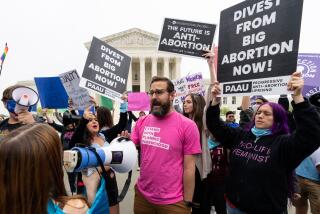Ruling Stands on Florida Paying for Transplant
- Share via
WASHINGTON — The Supreme Court let stand a ruling Monday requiring states to pay for costly transplant operations for young Medicaid patients.
Without comment, the justices rejected arguments from Florida health officials who said that they should not be forced to pay for organ transplants because the procedures are expensive and experimental.
The issue arose in the case of Lexen Pittman, a 20-month-old boy from Ft. Lauderdale who is not expected to live without a liver and bowel transplant.
The operation, which also depends on finding an organ donor, will cost between $300,000 and $500,000 at the University of Pittsburgh medical center, officials said.
When the Florida Agency for Health Care Administration balked at paying, lawyers for the boy’s mother took the issue to federal court.
In August, a U.S. appeals court in Atlanta ordered the state to pay for the operation and ruled that the Medicaid law requires the state to pay for “all medically necessary treatment” for eligible children younger than 21.
The high court’s refusal to hear the state’s appeal in the case (Florida vs. Pittman, 93-633) may end further legal challenges to the federal requirement.
The Medicaid law once gave states the option of providing organ transplants, but in 1989 Congress expanded the states’ responsibility to pay for medically necessary treatment for poor children.
“Some states are still unhappy over this, but we’ve made it clear we think the law is straightforward,” said Bruce Vladeck, administrator for the Health Care Financing Administration, which administers the Medicaid program.
In California, state health officials said that they authorize payment for organ transplants where they are deemed medically necessary and advisable.
“We have authorized a small number of liver and bowel transplants (for young children),” said Dr. George Wilson, chief of medical policy for the state Department of Health Services. “The issue revolves around the word necessary . We are concerned about the prognosis for survival.”
Wilson said that the state policy on paying for transplants has evolved along with medical science.
Before 1983, the state rarely paid for a transplant, he said, because the operation was considered experimental.
More to Read
Sign up for Essential California
The most important California stories and recommendations in your inbox every morning.
You may occasionally receive promotional content from the Los Angeles Times.














